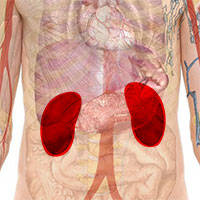Managing Kidney Health with Aging

Did you know that more people die each year from kidney disease than from breast or prostate cancer? However, initial symptoms can be rather general and can be confused for other conditions. Kidney disease is often left undiagnosed until kidney function is significantly decreased. This makes it all the more important for seniors to pay attention to kidney health and take steps to reduce their risk of kidney disease.
- Get Screened
A simple urine test can identify early signs of kidney disease, as can a blood test. According to the National Kidney Foundation, everyone over age 60 should be screened, and individuals at high risk should be tested annually. Early detection can lead to improved management of the disease and fewer complications.
- Manage Blood Pressure and Blood Sugar
Both high blood pressure and high blood sugar can take a toll on the kidneys and reduce their function. Seniors should be regularly monitoring their blood pressure and taking steps to keep it within an acceptable range through medication or lifestyle changes. Individuals with diabetes should be vigilant about checking their blood-glucose levels and administering insulin as necessary.
- Eat a Healthier Diet
Too much sodium, fat, and sugar are not only bad for your health, but bad for your kidneys. Try to create meals that include plenty of fresh vegetables, fruits, and fiber, limiting the amount of processed foods you eat. Focus on eating complex carbs that take longer to break down and don’t spike blood sugar like simple carbs do.
- Drink More Water
Dehydration can increase kidney problems. Have fresh water nearby at all times and continue to drink throughout the day even if you don’t feel thirsty. As you age, your sensation for thirst becomes weaker, so it’s important to remind yourself to keep drinking. Staying well hydrated helps your kidneys to flush out waste and excess fluid.
- Stay Active
Being overweight or obese puts extra strain on the kidneys. Strive to get at least 30 minutes of moderate exercise five days per week. Physical activity also helps boost heart health, lower blood pressure, decrease blood sugar, and reduce cholesterol levels. Start with something simple such as walking, biking, or swimming and work your way up to other exercises and longer durations.
Be Aware of Symptoms
Pay attention to changes in how you look and feel. If you notice that your feet and ankles have started to become swollen, your appetite has decreased, you’re experiencing headaches, you feel more tired than usual, or you have changes in the amount or appearance of your urine, talk to your doctor. They can help you determine if your symptoms may be associated with kidney disease or something else. Be proactive in order to catch problems early on.
Partnering with an in-home care provider can help you stay on top of taking medications, preparing healthy meals, being more active, scheduling doctor appointments, and much more. Feel more confident and comfortable aging in place knowing that you have the support you need when you need it. Contact Always Best Care today at (855) 470-2273 to schedule a free consultation and learn more about how you can benefit from in-home care.





